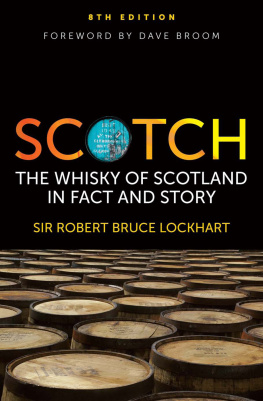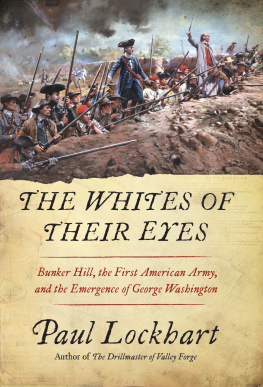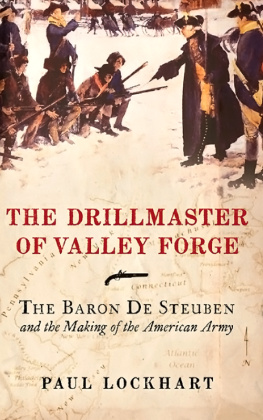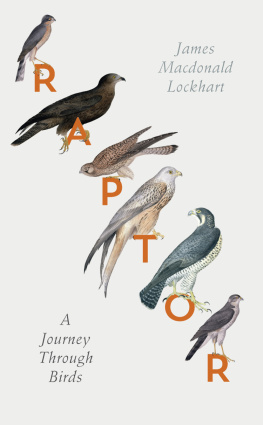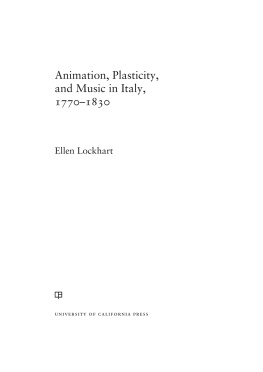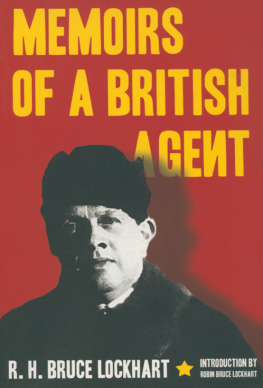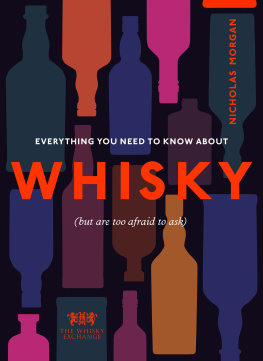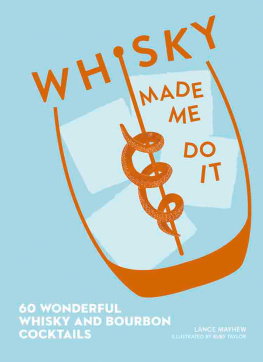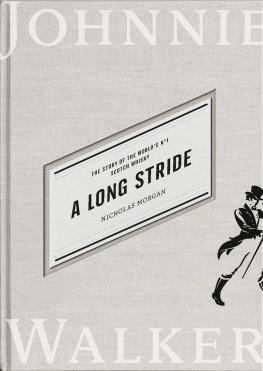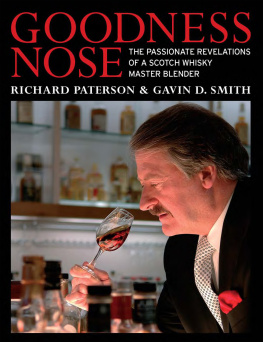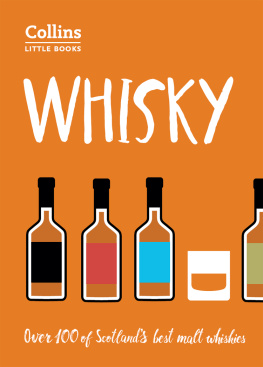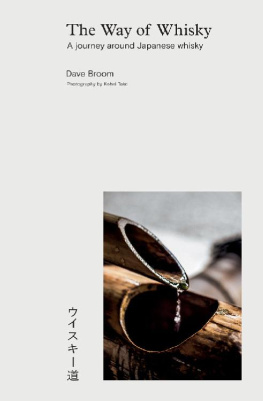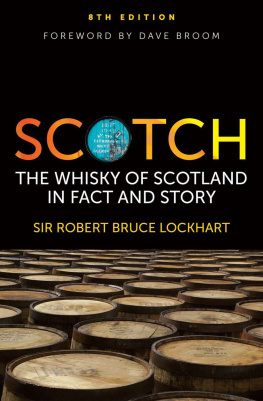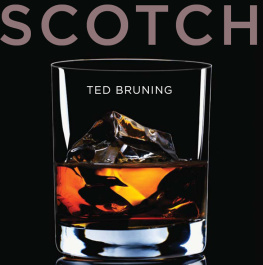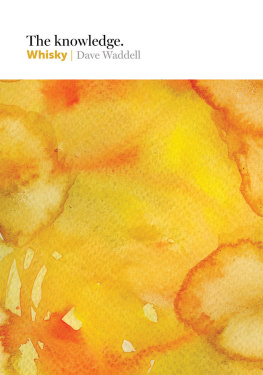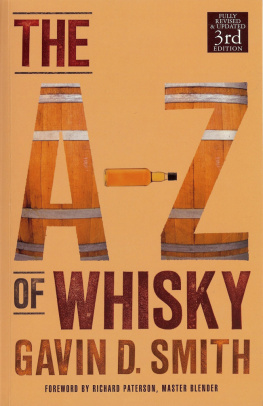A most interesting book on the ambrosia, staple sine qua non of hospitality.
New York Times
Brilliant. Clearly a labour of love.
Daily Telegraph
A very readable book written with that tenderness which springs from nostalgic familiarity while giving so much interesting information. A very human book; also a humorous one.
The Sunday Times
This is not simply a book about whisky, it is about a man and his relationship with his country.
From the Foreword by Dave Broom

FOREWORD
THE EARLY to-mid-20th century saw the appearance of a trio of whisky books which have yet to be surpassed: Aeneas MacDonalds Whisky, Neil M Gunns Scotland & Whisky and this book. Sadly, Robert Bruce Lockharts work has been somewhat overlooked, while the reputations of the other two continue to grow. It deserves better.
Were it not for the fact that Bruce Lockhart also wrote My Rod, My Comfort one would think that whisky was too sedate a subject for him. This was a man, after all, who as a spy, was imprisoned in the Kremlin and condemned to death for allegedly plotting to bring down the Bolshevik government by assassinating Lenin. His account of these early days, Memoirs of a British Agent, is Richard Hannay made real.
By the time that Scotch was written, Bruce Lockhart described himself as a writer and it is the literary aspects of his account of whiskys tale which make this book more than just an historical curiosity for whisky connoisseurs wishing to complete their collection.
Although at first glance the chapters promise little new, his prose immediately convinces the reader otherwise. His accounts of the whisky barons are historically accurate but avoid being prosaic records of business dealings because of his adept handling of the material. These arent business executives, but real people skillfully captured such as in this description of a Vanity Fair portrait of James Buchanan on his ennoblement as Lord Woolavington:
The red hair is now sand-coloured. The moustache, a little ragged but as long as ever, dwarfs the cigar which protrudes from the half-concealed lips. He wears a white butterfly collar with hunting pink tie and waistcoat and a brown coat from the breast-pocket of which dangles the finest of white linen handkerchiefs. The riding breeches are a magnificence of sponge-bag check; the neatest of riding legs are enclosed in the softest of buttoned leggings. The slender right hand holds a hunting-crop; the left is delicately inserted in the breeches pocket so as to show a neat white strip of shirt below the wellcut sleeve. Supporting all this elegance is the tall, graceful figure as slim and as erect as ever. James Buchanan, as a very rich man, is still the same dandy who came to London to initiate the unsuspecting English into the mysteries of whisky and in the process to make his own fortune.
This is the eye and the pen of a novelist at work. This isnt the man who created Black & White, this is a real character. This books greatness, however, does not lie in this skilful way with dry fact but rather with Bruce Lockharts first-hand account of Speyside or Strathspey as he insists as it was in his childhood at the turn of the 20th century. His mother was a MacGregor whose grandfather had founded the Balmenach Distillery (a whisky now as sadly overlooked as this book) after a gauger had encouraged him to take out a licence for yon peat shed.
The Strathspey of that time was a place of clearly-defined class divisions, where everyone doffed their caps to the gentry as they drove (or rode) by; a place where the first tongue of the older generation was Gaelic. He recalls black-clad old men mostly bearded, with long hairs protruding from their ears leaving the Gaelic service on Sundays; the same elders of the community were also the holders of the local folk tales, myths and legends and whisky-making knowledge, for in those days whisky, the poor mans drink, at 2/6 a bottle acted as a form of social adhesive, binding the people of Cromdale together.
On special occasions, too, like lamb sales or Cattle Show Day, almost the whole community used to go what was known locally as on the batter. Then nearly everyone from the doctors, the staid elders of the Kirk, and sometimes a minister, to the humblest farm hand or tinker imbibed freely. Tongues were loosed and stories swapped, and kinsman gave kinsman the news of a whole year with the detailed exactitude of men who, in those days of slow transport, lived far apart and saw one another rarely. Admittedly at the end of the day the trail home was often wobbly, but I do not think that much harm came from these meetings. They brought a scattered community together, gave it consciousness of its cohesion, and fostered good fellowship. They were, too, a reaction against puritanism and the drabness of daily life. I remember a Highland saying of those days: One whisky is all right, two is too much, and three is too few. Two makes you want another and after three you cant stop.
Although these days it is a line too oft-repeated by marketing departments with little understanding of its truth, whisky is made by people. Bruce Lockhart realised this more than Gunn or MacDonald. His managers, his gaugers are real people, as is his stillman: nearly always a splendid type of man with a sturdy belief in his own art and a scarcely concealed contempt for chemistry. Not for the first time when reading the book, you wonder what would he make of whisky today?
This picture of a community with a distillery at its heart is both powerful and historically fascinating, speaking as it does of an older way of distilling and aging, but it is the location and the people which stand out the most vividly. Bruce Lockhart didnt travel to every distillery. In fact, you wonder if he had been to many at all. He didnt need to. By focussing on Balmenach, he made Cromdale represent whisky and Scotland.
His last visit, in 1950, is elegiac, filled with memories of fishing for lusty trout, of a boyhood spent drinking the pure waters of the hill burn. After being given a dram of 15-year-old Balmenach he goes outside and sees as in a trance the days of my childhood .... It is a passage which carries within it echoes of Gunn, who one might think would be a strange friend for such a pillar of the establishment as Bruce Lockhart, yet the knight of the realm was a close friend of the Zen mystic of Sutherland. Both loved whisky and both were nationalists.
This book like Macdonalds and like Gunns is also a polemic; not just about the superiority of single malt whisky above all other drinks, but against the high taxation of Scotlands spirit and the consequences of those duties upon Scotland and Scottish consciousness. This is not simply a book about whisky, it is about a man and his relationship with his country. He concludes in this vein:
But most Scots, and I would say all Scots who think seriously of their countrys future, are resolved that Scotland shall have a larger control of her own national affairs, and of these whisky is certainly one.
... and this time you imagine he would be (almost) satisfied with his country in the 21st century. As for his fear that whisky is in mortal peril, I write as the world is taking to his native drink and to single malt with a passion he could only have imagined and in doing so it reflects back on the culture which gave it birth and which Bruce Lockhart valued so deeply.

